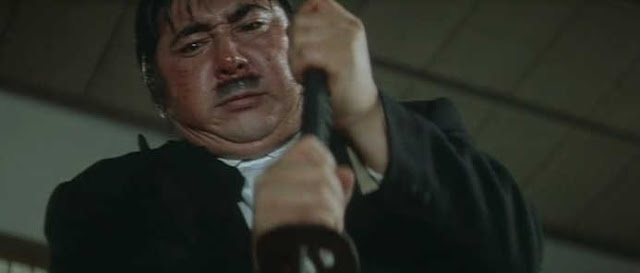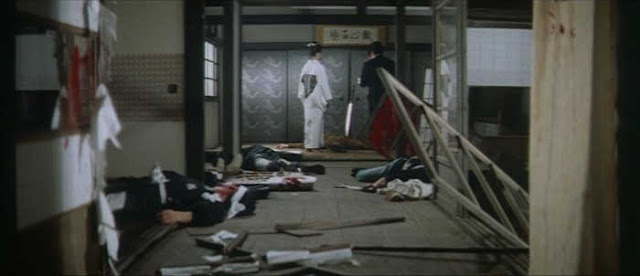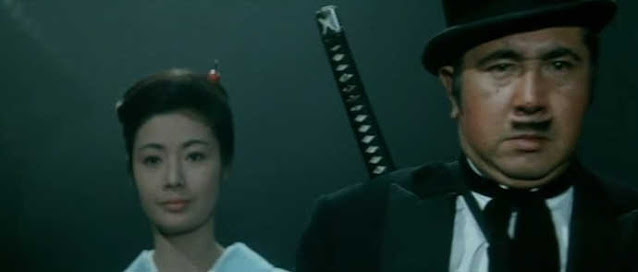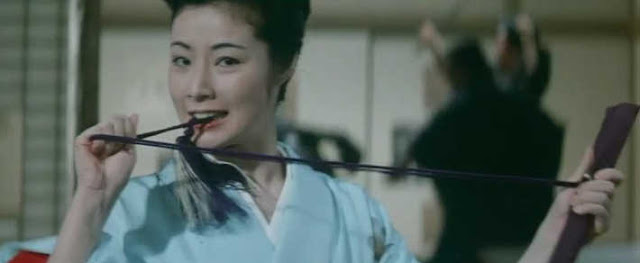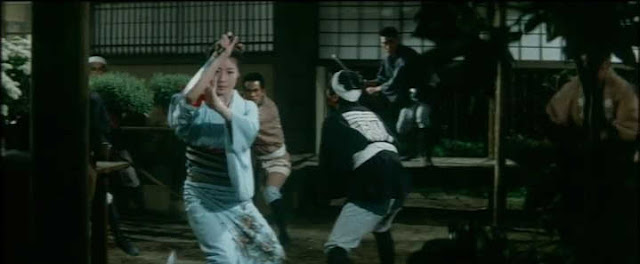Silk Boss Hat 1 & 2
Silk Boss Hat I (1970) - 8.0
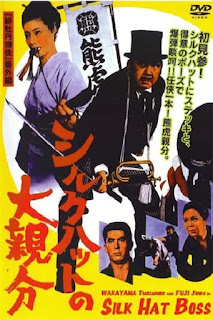
Kumatora as played by Tomisaburô
Wakayama is a wonderful character in his high silk top hat, wisp of a moustache,
freckles dotting his red cheeks and a growling bark much bigger than his
bite. Most of the time. Until pushed too far. He is part clown, part chivalrous
knight with an eye for the ladies of the geisha houses, a sentimental side
that will bring out his tears and a code of honor. He heads the Kumatora
Yakuza gang from Osaka. He first made an appearance though as a recurring
character in the Red Peony films and that got him his own series - though
sadly as far as I can tell that only consists of two films both released
in 1970 (along with 16 other films for Tomisaburô!). In those
he often helps out the Red Peony played by Junko Fuji. She returns the favor
here with a pistol and sword and a need for revenge.
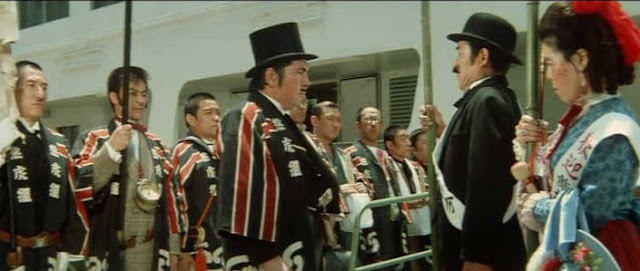
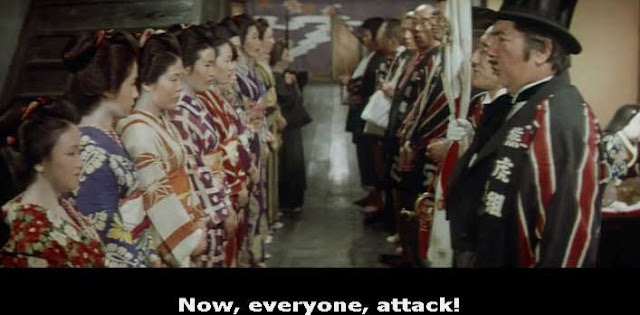
The film begins comically for much of the
first half until it turns on its head into a deadly series of fights. Kumatora
and his gang are returning from the 1905 Russo-Japanese War in which Japan
was the first Asian nation to defeat a European power. As the camera pans
from one gang member to another they just get goofier looking. Not a scary
bunch. Till they fight. They carry with them the ashes of three fallen comrades
and are full of pride for their participation as laborers in a great victory.
They expect a huge reception and so Kumatora even takes a bath - with his
top hat on. But no one is waiting for them and they soon learn that another
Yakuza boss - Chindai - has gotten all the credit and is having a party thrown
for him by the military. Kumatora crashes it and the beginning of a feud
between the two gangs starts to percolate. Meanwhile in a lengthy funny scene
the gang heads for a brothel and decide who will be their paramour for the
night - after Kumatora sniffs under their kimonos to be sure all is right
in the world. They choose by reverse age but Kumatora ends up with a Otama,
a 14-year old who tells him her nickname is Thousand Man Killer. Still he
ends up only digging the wax out of her ear.
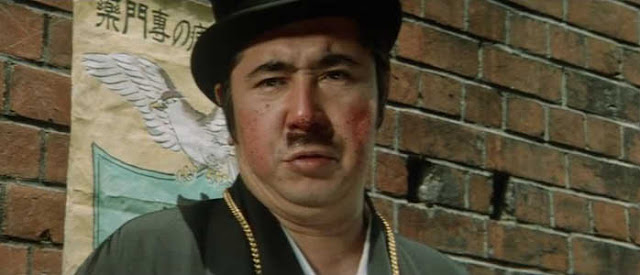
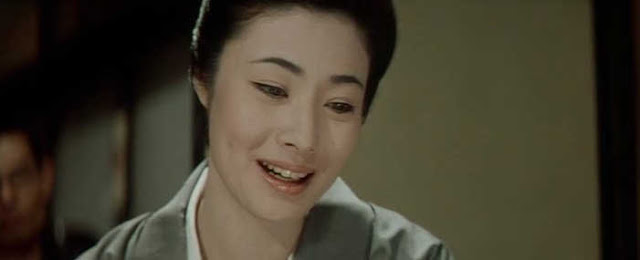
The enmity continues to grow as Chindai
gets a military contract to supply laborers and supplies to Manchuria by
bribing a few well placed officers. But then a General comes to Kumatora
and asks him to do the same because he heard of his bravery during the war.
And the enmity moves into open warfare as Chindai does everything he can
to stop Kumatora from fulfilling his order. At one point Kumatora has freed
a large group of prisoned geishas from Chindai and is cornered against about
20 men with it looking hopeless and out of the darkness strolls the Red Peony.
Their ending together side by side cutting down men is a classic. Really
enjoyed how this film shifts from being a bit silly to pure ninkyo eiga.
A number of memorable characters fill up the story. Directed by Norifumi
Suzuki.
Silk Boss Hat II
(1970) - 7.5
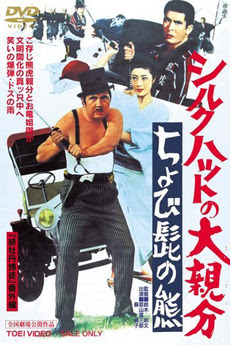
Boss Kumatora (Tomisaburô Wakayama)
returns in this second and I believe final film in the series. They are good
fun and I wish there were more of them. Kumatora is one of the nicer Yakuza
bosses on film until he is wronged - then one of the more brutal. His caterpillar
moustache still as firmly in place as his top hat though his freckles appear
to have migrated from his cheeks to the underneath of his nose. The format
of this film is similar to the first - comedy dominates the first half and
then it gets down to the drama and the killing. The Red Peony (Junko
Fuji) once again shows up at around the one hour mark to save him from sure
death. I could have done with a little less comedy I suppose and more Junko
but it is a workable combination. While you sit through the antics, you know
the action is only a shout away.
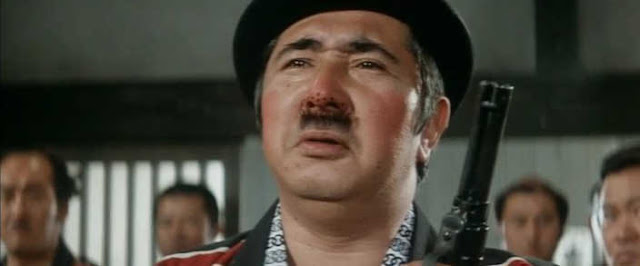
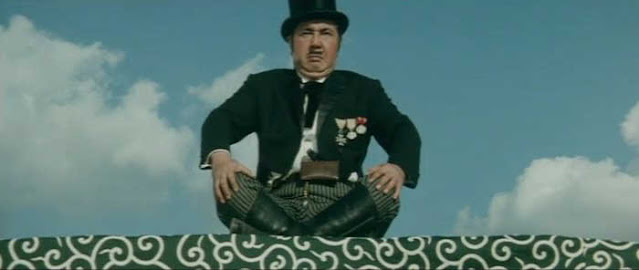
Kumatora and his crew of like-minded Yakuzas
are holidaying at a hot spring Geisha resort. Lots of drinking and flirting
going on. One of the female hostesses has her eye on Kumatora - who he claims
is the handsomest man in Japan - and gives him a bottle of aphrodisiacal
pills to get prepared. Made of extracts of seal penis and whale testicles.
But he notices that in a small room the female owner and widow of the establishment
is about to kill herself with a bottle of arsenic pills because she is in
debt to another Yakuza gang - the Yokokawa family. Kumatora rushes in to
stop her and in the melee that follows she grabs the wrong pills and lights
her hormones on fire. Afterwards he tells his fellow gang members that he
felt like clams were attacking him and he has been sucked dry. He then persuades
the Yokokawa to let her keep the inn. At the end of a gun.
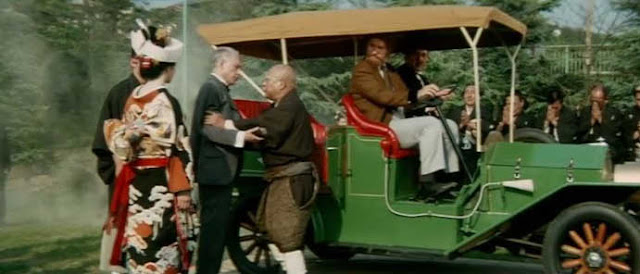
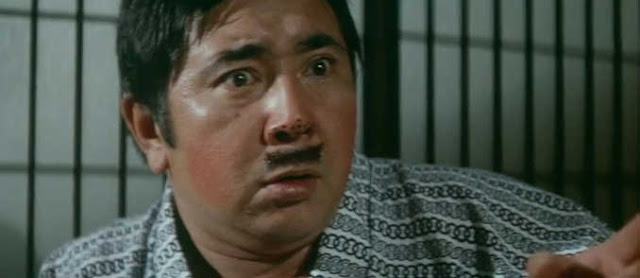
He also finds time to save a young lady
on a runaway horse carriage and is later thanked and employed by her father,
a wealthy Viscount. The Viscount is so impressed by Kumatora that he asks
him to protect and deliver the first automobile - a Packard - in Japan. It
will be presented to his Emperor. At one point Kumatora accidently drives
the car and we get a Chaplin like scene of a car careening through the town.
Another business group along with the Yokokawa want to establish the first
car importing business and so get very rough in stopping Kumatora, Too rough.
Kumatora likes a good bash up as much as anyone but dynamite is going too
far. He does the walk at the end. Sword in hand. From the shadows comes a
voice "Can I walk with you". The Red Peony. Death lies ahead. Directed by
Norifumi Suzuki.







